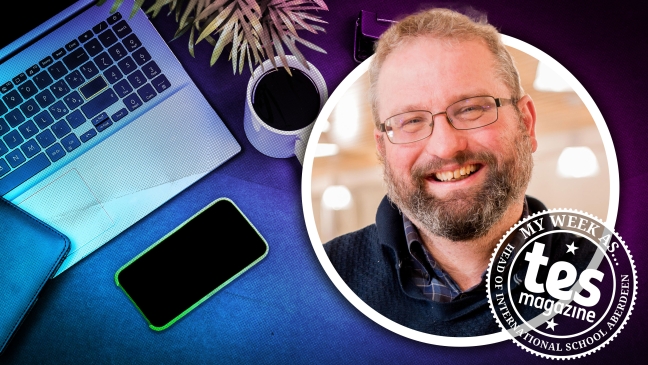
- Home
- Leadership
- Strategy
- My Week As... head of International School Aberdeen
My Week As... head of International School Aberdeen

Nick Little has been head of International School Aberdeen, one of only two international schools in Scotland, since 2018.
He previously spent 16 years in the international education sector in Shanghai and has also worked on International Baccalaureate accreditation teams for various bodies in Hong Kong, Uganda, Singapore, Indonesia and China.
International School Aberdeen was initially founded as the American School in Aberdeen in 1972, on the back of the North Sea oil boom. It takes pupils from 3-18 and is one of a handful of schools in Scotland that offers the IB.
Little tells Tes about the challenges and rewards of a typical working week.
Morning routine
On Monday morning IŌĆÖm at my desk just before 7.30am. At the beginning of the school year we introduced a ŌĆ£right to switch offŌĆØ policy that disallows emails after 5pm or before 7am or at the weekend, so I have a little flurry first thing on Monday as the ŌĆ£schedule-sendsŌĆØ kick in.
Ours is a small school - 500 students, about half British, the other half of 50 different nationalities, brought to Aberdeen by the oil industry. Promoting international citizenship is an important part of our mission.
At 8am I go to the foyer to welcome the students. As we donŌĆÖt have a uniform, I can really focus on greetings rather than correcting infringements. In a 3-18 school you get a variety of responses: today, Alice in preschool is keen to show me her new sparkly shoes; William, in grade 1, tells me he scored 23 goals against his dad at the weekend; alas, most high-schoolers manage little more than a grunt.
Meetings
On Monday mornings I meet with our chief financial officer and principals about ongoing operational matters. Later IŌĆÖm with the wider leadership team, including the assistant principals, head of early years, IT director and social-emotional counsellor. We either review policies or implementation of our school plan.
After school on Mondays we discuss and update individual education plans. Later in the week I meet with our designated child-protection coordinators about more serious pastoral concerns; for some, we work with social services or other outside agencies. Every week thereŌĆÖs at least one incident that requires me to intervene directly with a student and their family.
Every Tuesday morning our compliance officer, facilities manager, the principals, the school nurse and I talk through health and safety issues. This could be reviewing relevant policies or checking risk assessments for upcoming trips. On the day I write this weŌĆÖve been looking back over a month of records for accidents and illnesses.
Every other week I discuss ongoing concerns with the staff reps - this week itŌĆÖs about the arrangement of cover for a first-aid course. At the end of each week I host a hybrid (online and in person) coffee morning for parents. We have an open agenda, with the proviso that individual issues must be dealt with offline and in private afterwards.
Developing practice
Every week all teachers meet in various groups with the intention of developing our practice. Recently IŌĆÖve been part of a group looking at ways to involve students more in decision making, with a preschool colleague presenting on how three- to five-year-olds discuss classroom rules.
The group also includes teachers of elementary French, middle-school maths, high-school science, the athletics director and the social and emotional counsellor. It is looking to involve students in curriculum development, too.
We set up a tech committee during the pandemic to cope with the rapid changes around online learning, which we never disbanded. It now comes together regularly to discuss the impact of tech on education. Last month we looked at teaching responsible and effective use of artificial intelligence.
Allowing room and time for development of our curriculum is important. We offer the International Baccalaureate Diploma for university entrance, and are now introducing the IBŌĆÖs primary and middle-years programmes for younger students. These are more frameworks than prescriptive curricula, allowing international schools to flexibly respond to the students in front of them.
Flexible approaches are also about neurodiversity. For the past year-and-a-half we have been working with Dr Jamie Galpin and the National Association for Special Educational Needs to create more inclusive lessons through .
Popping in, catching up
In between planned meetings thereŌĆÖs a lot of ŌĆ£popping-insŌĆØ and ŌĆ£catching-upsŌĆØ. Today this includes: the nurse about a tummy bug in one of the elementary grades; the IB coordinator about the Diploma exams; and the principals, assistant principals and the counsellor about ongoing student or staffing issues. I touch base with the facilities manager about progress installing our solar panels - theyŌĆÖre expected to save us tens of thousands of pounds in electricity.
I have a lunch supervision, which starts in the canteen, passes the gym and ends on the lower pitches. Like the morning greetings, itŌĆÖs a great chance to talk to individual students - the high-schoolers are fully awake by this time. From time to time I have lunch with groups of students around an issue (for example, football at recess time).
IŌĆÖve been talking to an IB extended essay student, Amir - who is Kazakh - about his research into democracy in Muslim countries. Grade 4s are preparing to perform a play they have written themselves, and one, Ruzgar, sticks his head around my door at breaktime, keen to share his views on how itŌĆÖs progressing.
Personal time
As headteachers will often say, ŌĆ£I donŌĆÖt really have spare time in the evenings during term time.ŌĆØ IŌĆÖm trying to carve out time to read The Mountain in the Sea by Ray Naylor. I swim every other evening - itŌĆÖs incredibly relaxing - and take walks with my wife in AberdeenŌĆÖs many beautiful parks. On Friday evenings I play Civilisation VI online with an old schoolfriend, and IŌĆÖm working my way through Yellowstone on Netflix.
What I would like to do more or less of
The emails are endless - technology has made communication so much easier, which is a blessing and a curse.
I end each week with the nagging feeling of something not yet done or said, or something that could have been done or said differently, but this a spur to do better. I love my job - to positively impact the lives of others is a privilege that all educators have.
Nick Little was talking to Henry Hepburn
Want to keep reading for free?
Register with Tes and you can read five free articles every month, plus you'll have access to our range of award-winning newsletters.
Register with Tes and you can read five free articles every month, plus you'll have access to our range of award-winning newsletters.
Keep reading for just ┬Ż4.90 per month
You've reached your limit of free articles this month. Subscribe for ┬Ż4.90 per month for three months and get:
- Unlimited access to all Tes magazine content
- Exclusive subscriber-only stories
- Award-winning email newsletters
You've reached your limit of free articles this month. Subscribe for ┬Ż4.90 per month for three months and get:
- Unlimited access to all Tes magazine content
- Exclusive subscriber-only stories
- Award-winning email newsletters
topics in this article




